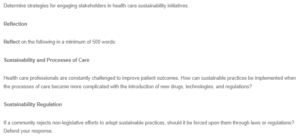Health Care Sustainability Initiatives
Sustainability and Processes of Care
Implementing sustainable practices in healthcare is critical, especially as the area gets more complex as new treatments, technologies, and laws are introduced. Sustainability in healthcare extends beyond environmental issues to include resource efficiency, cost-effectiveness, and ensuring that the treatment delivered today does not jeopardize future generations’ well-being. Healthcare workers can use a variety of techniques to overcome this difficulty. To begin, they can prioritize evidence-based procedures to guarantee that new treatments and technologies are adopted based on their demonstrated efficacy and long-term viability. Healthcare businesses can engage in employee training and education to maximize resource utilization, eliminate waste, and lower the environmental footprint of care delivery (Sullivan et al., 2023). Furthermore, coordination among healthcare providers, pharmaceutical companies, and regulators is critical to striking a balance between innovation and sustainability, ensuring that new treatments and technology meet clinical and environmental criteria.
In the face of rising complexity, healthcare practitioners must take a more holistic approach to patient care that takes into account the environmental and societal implications of their actions. Rethinking treatment methods to reduce waste and energy consumption, as well as adding renewable energy sources and green building techniques into healthcare facilities, can all contribute to more sustainable care processes. Furthermore, telemedicine and remote monitoring can help to reduce the carbon footprint associated with patient visits and hospital stays. Finally, incorporating sustainability into healthcare procedures necessitates a mentality shift in which healthcare workers see themselves not only as caretakers but also as resource stewards and champions for a better planet. Healthcare may enhance patient outcomes while simultaneously contributing to a healthier, more environmentally conscious future by using sustainable practices.
Sustainability Regulation
`The decision to impose sustainable habits on a community through laws and regulations is a difficult ethical and practical quandary. While sustainability is critical for the planet’s and future generations’ well-being, it is critical to handle this issue with sensitivity and respect for individual and community autonomy. Instead of imposing harsh laws right away, it is often more productive to engage in a full debate and education effort. Communities should be informed about the benefits of sustainability, the potential consequences of unsustainable practices, and how they might freely embrace more environmentally friendly habits (Osarodion Ogiemwonyi et al., 2023). This strategy encourages community buy-in, develops a sense of ownership, and may result in more long-lasting and meaningful change.
However, if non-legislative attempts continually fail and unsustainable activities pose serious environmental or public health hazards, imposing restrictions may be justified. These policies should ideally be designed with community consultation, take into account the community’s particular circumstances and difficulties, and try to strike a balance between preserving the common good and respecting individual rights. The goal should not be punitive but rather to ensure that the acts of the community do not have a negative influence on the larger environment and society. In such circumstances, enforcement should be complemented by assistance and resources to assist the community in making the shift to more sustainable practices. Ultimately, the decision to force sustainable practices through laws or regulations should be made with careful consideration of the specific circumstances and with a commitment to finding the least intrusive and most effective solutions. It is critical to acknowledge that sustainable practices can provide long-term economic and social advantages to communities (Suriyankietkaew et al., 2022). Regulations should be supplemented by incentives and assistance programs to help communities move to more sustainable practices as painlessly as possible. These incentives could include tax exemptions, grants, technical support, and education activities focused on increasing local sustainability capability.
References
Osarodion Ogiemwonyi, Mohammad Nurul Alam, Rashed Alshareef, Majed Alsolamy, Noor Azlinna Azizan, & Mat, N. (2023). Environmental factors affecting green purchase behaviours of the consumers: Mediating role of environmental attitude. 100130–100130. https://doi.org/10.1016/j.cesys.2023.100130
Sullivan, G. A., Petit, H. J., Reiter, A. J., Westrick, J. C., Hu, A., Dunn, J. B., Gulack, B. C., Shah, A. N., Dsida, R., & Raval, M. V. (2023). Environmental Impact and Cost Savings of Operating Room Quality Improvement Initiatives: A Scoping Review. Journal of the American College of Surgeons, 236(2), 411. https://doi.org/10.1097/XCS.0000000000000478
Suriyankietkaew, S., Krittayaruangroj, K., & Iamsawan, N. (2022). Sustainable Leadership Practices and Competencies of SMEs for Sustainability and Resilience: A Community-Based Social Enterprise Study. Sustainability, 14(10), 5762. https://doi.org/10.3390/su14105762
ORDER A PLAGIARISM-FREE PAPER HERE
We’ll write everything from scratch
Question

Health Care Sustainability Initiatives
Determine strategies for engaging stakeholders in health care sustainability initiatives.
Reflection
Reflect on the following in a minimum of 500 words:
Sustainability and Processes of Care
Health care professionals are constantly challenged to improve patient outcomes. How can sustainable practices be implemented when the processes of care become more complicated with the introduction of new drugs, technologies, and regulations?
Sustainability Regulation
If a community rejects non-legislative efforts to adopt sustainable practices, should it be forced upon them through laws or regulations? Defend your response.


